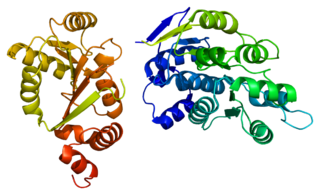 W
WThe Y chromosome is one of two sex chromosomes (allosomes) in mammals, including humans, and many other animals. The other is the X chromosome. Y is normally the sex-determining chromosome in many species, since it is the presence or absence of Y that typically determines the male or female sex of offspring produced in sexual reproduction. In mammals, the Y chromosome contains the gene SRY, which triggers male development. The DNA in the human Y chromosome is composed of about 59 million base pairs. The Y chromosome is passed only from father to son. With a 30% difference between humans and chimpanzees, the Y chromosome is one of the fastest-evolving parts of the human genome. The human Y chromosome carries an estimated 100-200 genes, with between 45 and 73 of these protein-coding. All single-copy Y-linked genes are hemizygous except in cases of aneuploidy such as XYY syndrome or XXYY syndrome.
 W
W40S ribosomal protein S4, Y isoform 1 is a protein that in humans is encoded by the RPS4Y1 gene.
 W
WAdenine nucleotide translocator (ANT), also known as the ADP/ATP translocase (ANT), ADP/ATP carrier protein (AAC) or mitochondrial ADP/ATP carrier, exchanges free ATP with free ADP across the inner mitochondrial membrane. ANT is the most abundant protein in the inner mitochondrial membrane and belongs to mitochondrial carrier family.
 W
WAmelogenin, Y isoform is a protein that in humans is encoded by the AMELY gene. AMELY is located on the Y chromosome and encodes a form of amelogenin. Amelogenin is an extracellular matrix protein involved in biomineralization during tooth enamel development.
 W
WTestis-specific basic protein Y 2 also known as basic charge, Y-linked 2 is a protein that in humans is encoded by the BPY2 gene which resides on the Y chromosome.
 W
WDeleted in azoospermia 1, also known as DAZ1, is a protein which in humans is encoded by the DAZ1 gene.
 W
WDeleted in azoospermia protein 2 is a protein that in humans is encoded by the DAZ2 gene.
 W
WATP-dependent RNA helicase DDX3Y is an enzyme that in humans is encoded by the DDX3Y gene.
 W
WEukaryotic translation initiation factor 1A, Y-chromosomal is a protein that in humans is encoded by the EIF1AY gene.
 W
WLysine-specific demethylase 5D is an enzyme that in humans is encoded by the KDM5D gene. KDM5D belongs to the alpha-ketoglutarate-dependent hydroxylases superfamily.
 W
WPCDH11Y is a gene unique to Homo males that encodes Protocadherin 11Y, a protein that guides the development of nerve cells. PCDH11X, located on the X chromosome, is common, in both sexes, to humans and our nearest relative, the chimpanzee; however, PCDH11Y, located on the Y chromosome, is unique to males.
 W
WRNA-binding motif protein, Y chromosome, family 1 member A1/C is a protein that in humans is encoded by the RBMY1A1 gene.
 W
WTestis-determining factor (TDF), also known as sex-determining region Y (SRY) protein, is a DNA-binding protein encoded by the SRY gene that is responsible for the initiation of male sex determination in therian mammals. SRY is an intronless sex-determining gene on the Y chromosome. Mutations in this gene lead to a range of disorders of sex development (DSD) with varying effects on an individual's phenotype and genotype.
 W
WThymosin beta-4, Y-chromosomal is a protein that in humans is encoded by the TMSB4Y gene.
 W
WTestis-specific Y-encoded protein 1 is a protein that in humans is encoded by the TSPY1 gene.
 W
WUbiquitin specific peptidase 9, Y-linked , also known as USP9Y, is an enzyme which in humans is encoded by the USP9Y gene. It is required for sperm production. This enzyme is a member of the peptidase C19 family and is similar to ubiquitin-specific proteases, which cleave the ubiquitin moiety from ubiquitin-fused precursors and ubiquitinylated proteins.
 W
WHistone demethylase UTY is an enzyme that in humans is encoded by the UTY gene.
 W
WZinc finger Y-chromosomal protein is a protein that in humans is encoded by the ZFY gene of the Y chromosome.